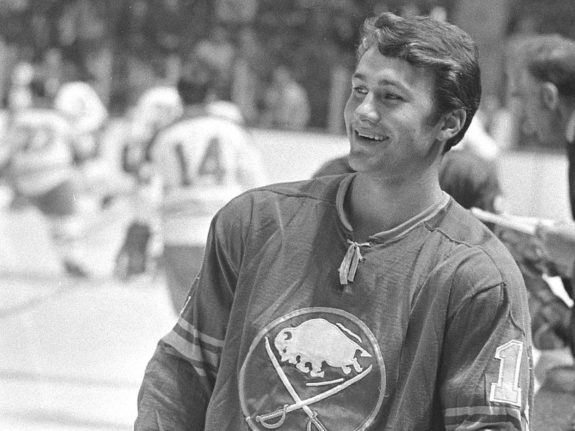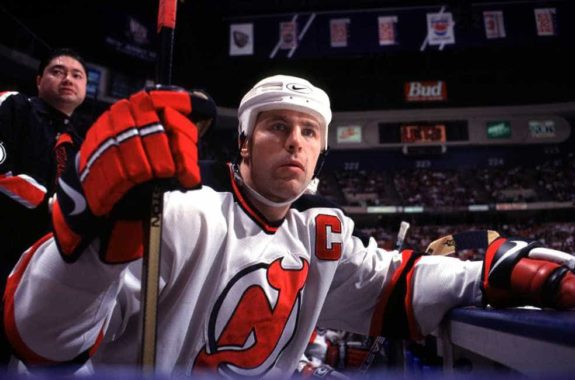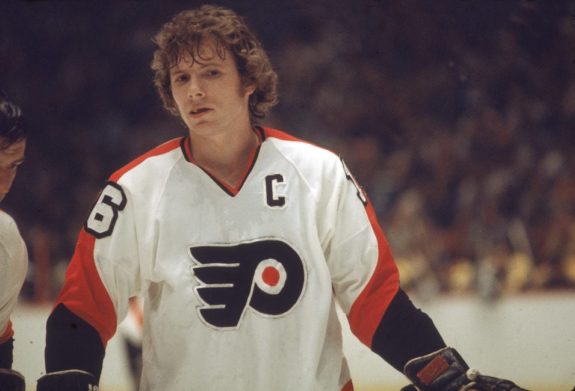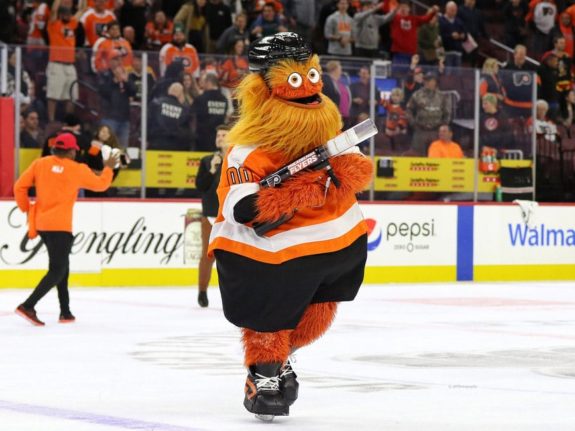Sept. 24 has been a very busy day in National Hockey League history that saw everything from rule changes, coaching hires, a new captain, and the induction of a talented Hall of Fame class. This date saw one of the most memorable slashing penalties ever to take place on the international stage. So, let’s begin our daily trip back in time to relive it all.
Canada Returns the Favor
Two days after the Soviet Union scored five third-period goals to win Game 5, the Summit Series returned to action on Sept. 24, 1972. Down 3-1-1 after blowing a 4-1 lead in the previous game, the Canadians showed some resolve with a comeback victory of their own.
Team Canada felt that they had to compete with not only the Soviet Union but also the West German officiating crew. There were no goals in the first period, but Canada had to kill off six penalty minutes. At the end of the night, 31 penalty minutes were called against the Canadians, while just four were dished out to the Soviets.
Yuri Liapkin broke the scoreless tie, just over a minute into the second period, when his shot from the blue line found the back of the net. Canada responded with sustained pressure, and it eventually led to three goals in a span of just 1:23.
Dennis Hull tied the game by putting home the rebound off of a Rod Gilbert shot. Yvan Cournoyer gave Canada a 2-1 lead just over a minute later. Paul Henderson scored the eventual game-winning goal just 15 seconds after Cournoyer’s go-ahead tally.
Bobby Clarke committed one of the most infamous penalties in the history of the game just a couple of minutes later. At the admitted direction of assistant coach John Ferguson, Clarke took a two-handed slash on the ankle of Valeri Kharlamov, the Soviet’s top scorer. Despite a broken ankle, Kharlamov finished the game. However, he missed Game 7 and was ineffective for the eighth and final game of the series. Clarke received a minor for slashing and a 10-minute game misconduct penalty.
Alexander Yakushev scored a power-play goal to make it a one-goal game heading into the second intermission. Things settled down a bit in the third period, with no goals and just one penalty called. Canada held on for the 3-2 victory and gained confidence heading into the final two contests of the series.
1990 Hall of Fame Class in Inducted
Four new members were officially enshrined into the Hockey Hall of Fame on Sept. 24, 1990, during a ceremony in Toronto. Players Bill Barber, Fern Flaman, and Gilbert Perreault took their place among the all-time greats and builder Bud Poile.
Barber spent his entire 12-season career with the Philadelphia Flyers and was a member of the famed Broad Street Bullies, who won back-to-back Stanley Cups in 1974 and 1975. He scored 420 goals, the most in franchise history, and 883 points in 903 games. His best season came in 1975-76 when he scored 50 goals and 112 points. He had 10 seasons with at least 30 goals and five with 40 or more.
Flaman played 14 seasons for the Boston Bruins with a four-season stint for the Toronto Maple Leafs sandwiched in the middle. The defenseman played 911 games between 1945 and 1961, winning the Stanley Cup with the Maple Leafs in 1951.
Perreault was the first star in Buffalo Sabres history. Both joined the league in the 1970-71 season, when Perreault won the Calder Trophy, for being the rookie of the year, by scoring 38 goals and 72 points. He spent his entire 17-season career with Buffalo and is the franchise’s all-time leader in games played (1,191), goals (512), assists (814), and points (1,326).

Poile played 311 games in the NHL, but he was inducted on this date for his work off the ice. After 13 seasons as a head coach in the Western Hockey League (WHL), he became the first general manager in Flyers history. Before leaving to become the first general manager of the Vancouver Canucks, he drafted some key players in Philadelphia’s championship success of the 1970s. His career in the game of hockey lasted over six decades. His son, David, has been the one and only general manager of the Nashville Predators.
Stevens Named Captain
On Sept. 24, 1992, the New Jersey Devils named Scott Stevens their new team captain, replacing Brice Driver. He was the 11th captain in franchise history and the fifth since Colorado Rockies relocated east in 1982 and became the Devils.

Stevens is the longest-serving captain the team has ever had as he wore the “C” for the next 12 seasons until he retired in 2004. He got to skate to center ice three times to receive Lord Stanley’s Cup from NHL commissioner Gary Bettman; in 1995, 2000, and 2003.
New Rule Changes Implemented
The NHL implemented a 10-minute overtime period on Sept. 24, 1927, taking effect for the start of the 1927-28 season. This period was eliminated altogether in November of 1942 due to wartime restrictions. The league had no overtime until it added a five-minute period before the 1983-84 season.
A decade later, on Sept. 24, 1937, the league adopted the icing rule, making it illegal for a team to shoot the puck from their own zone across the opposite goal line. The NHL changed this rule in 2005 by no longer allowing the team who iced the puck to change players. The current rule of hybrid icing was implemented ahead of the 2013-14 season.
Odds & Ends
The Detroit Red Wings signed forward Carl Liscombe on Sept. 24, 1935. He scored 137 goals and 277 points in 380 games, over nine seasons, for the team. He had six goals and 14 points in 10 postseason games, helping the Red Wings win the 1943 Stanley Cup.
On Sept. 24, 1937, the Montreal Maroons hired Hall of Fame defenseman, King Clancy, as their new head coach. The team went 12-30-6 under Clancy, the final season of the franchise. He went 16 years before getting his next head coaching job with the Maple Leafs in 1953.
Three years before his memorable slash, Clarke played in his first game with the Flyers on Sept. 24, 1969.

He picked up two assists in a 2-2 preseason tie versus the Quebec Aces of the American Hockey League (AHL). He went on to spend the next 15 seasons with the Flyers and is the all-time franchise leader in games played (1,144), assists (852), and points (1,210).
The St. Louis Blues acquired defenseman Phil Housley on Sept. 24, 1993, from the Winnipeg Jets for forward Nelson Emerson and defenseman Stephane Quintal. Housley played just 26 games for the Blues during the 1993-94 season. On July 4, 1994, he was traded to the Calgary Flames for Al MacInnis in a swap of Hall of Fame blueliners.
The Phoenix Coyotes named Dave Tippett their new head coach, on Sept. 24, 2009, replacing Wayne Gretzky. He was the 16th coach in franchise history and the sixth since the Jets relocated to Arizona in 1996. He went 282-257-83 over eight seasons behind the bench and took the Coyotes to the 2012 Western Conference Final.
On Sept. 24, 2018, the Flyers introduced the world to their new mascot, Gritty.

His odd appearance made him an instant hit, and he has been one of the most popular mascots in all professional sports.
Happy Birthday to You
A total of 17 players to skate in at least one NHL game was born on this date. The first to debut in the league was Albert Holway, born on Sept. 24, 1902. He played defense in 116 games, for three teams, between 1924 and 1929. Defenseman Brent Lernout, turning 26 today, made his debut with the Canadiens back in 2016.
Other notable players born on this date include Tim Ecclestone (73), Karl Alzner (33), and the late Dave Maloney.